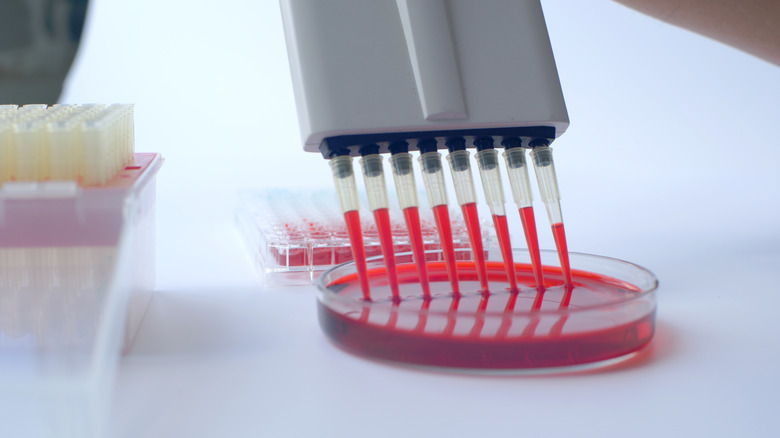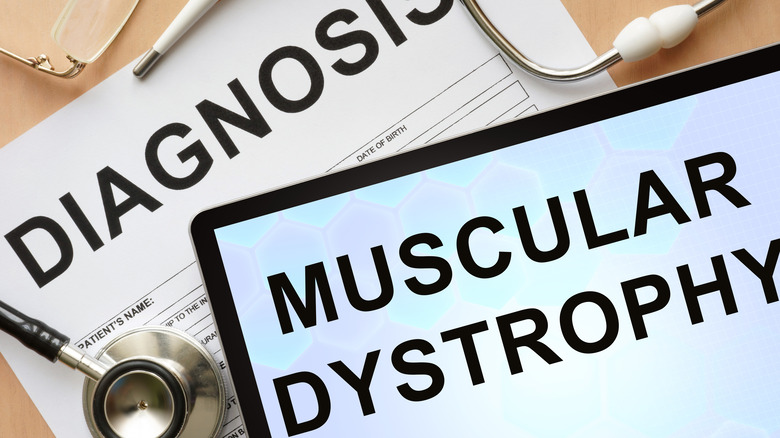What It Means When Your Creatine Kinase Is High
Each cell in the body has thousands of enzymes performing numerous functions (via MedicalNewsToday). Creatine kinase (CK), also known as creatine phosphokinase, is an enzyme found in the muscles, heart, and brain, per Johns Hopkins Lupus Center. It comes in three main types, including CK-MM, CK-MB, and CK-BB, mostly found in the skeletal muscles, heart muscle, and brain tissue, respectively (via MedlinePlus). Together, creatine kinase functions by adding a phosphate group to creatine, turning it into phosphocreatine which helps your body generate energy (via the Cleveland Clinic).
You'll need to take a test to understand how much creatine kinase is in your blood. Creatine kinase levels are measured in units per liter of serum (U/L). According to Testing.com, the normal range varies depending on the laboratory. Typically, levels are higher in men than in women. As a guide, a healthy creatine kinase level for women should range from 30 to 145 U/L and 55 to 170 U/L for men.
If your creatine kinase levels are high, various causes are at play which we'll discuss further. As for the symptoms, high CK levels can manifest through mild symptoms, but some cases may become critical, demanding adequate medical assistance.
Causes of high creatine kinase levels
When creatine kinase levels are flagged as abnormally high, various factors can account for this. Usually, the specific type of CK enzyme detected will determine the condition associated with high creatine kinase results (MedlinePlus). For instance, higher than normal CK-MM enzymes may stem from muscular injuries such as rhabdomyolysis or muscular dystrophy, while an abnormally high CK-MB enzyme may be linked with heart attacks. High creatine kinase levels involving the CK-BB enzymes can be interpreted as stroke or brain injury, per MedlinePlus.
According to a 2016 study published in the Cleveland Clinic Journal of Medicine, you may experience high creatine kinase levels due to common hormonal disorders such as hyperthyroidism or metabolic disturbances like hypokalemia. Other possible causes of high creatine kinase levels include conditions like lupus, rheumatoid arthritis, celiac disease, or kidney failure. High creatine kinase levels may also be a side effect of certain antiretrovirals, beta-blockers, and other medications. Furthermore, muscle diseases, muscular injuries, and inflammatory conditions like polymyositis can cause creatine kinase levels to rise beyond normal, says the Cleveland Clinic.
Treating muscle problems due to high creatine kinase
A proper diagnosis is needed to determine what's causing your high creatine kinase levels. In addition to an enzyme test, a muscle biopsy will help your doctor distinguish between muscular dystrophy and other muscle diseases, per the Mayo Clinic. According to the clinic, muscular dystrophy currently has no cure. However, various treatment options exist to help manage the symptoms. According to WebMD, your doctor might prescribe antiseizure and blood pressure medications if you experience muscle spasms or heart problems. Immunosuppressants and steroids may also help with muscle cell damage associated with muscular dystrophy. However, these drugs may lead to certain unwanted side effects like weak bones.
For rare muscular heart problems like rhabdomyolysis, immediate specialist care and the consistent monitoring of the patient's creatine kinase level might be needed to ensure it doesn't go beyond the normal range, per this 2018 case study published in Case Reports in Women's Health. Rhabdomyolysis at its early stage may only require lifestyle changes like drinking more fluids, avoiding heat, and getting enough rest (via Centers for Disease Control and Prevention). When the condition becomes severe, intravenous fluids will help flush out muscle electrolytes and proteins, reducing the risk of dangerous heart rhythms and loss of kidney function.



